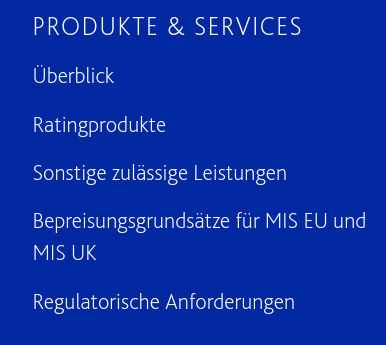In 1991 Moody’s presented itself in full-page advertisements as the first German credit rating agency. Moody’s Investors Service now achieves an average operating margin of over 60% worldwide. However, after three decades, the German-language website of this leading international agency is still in a deplorable state. After so many years, Moody’s German website still does not live up to its claim to be the “first German credit rating agency”.
It is due to the special history of the Federal Republic of Germany after the Second World War that, in contrast to France and other neighboring countries, in Germany, practically everyone had to learn English in such a way that every German could obtain information from sources in English language. A large number of American soldiers were stationed around the financial center of Frankfurt am Main until the 1990s. The British used to be numerous in other parts of Germany. In the financial sector in particular, the English language became so established that today it is even the internal working language in some banks.
Against this background, it is more than understandable if hardly anyone at the US credit rating agency thinks about what is on the German website. Anyone who can afford a credit rating from Moody’s Investors Service is sure to speak English. The most important functions of this credit rating are in the international financial markets anyway, so that this service is closely linked to the world markets. The language of the world’s financial markets has remained English to this day.
Even if the professionals get information from English-language sources, it does matter what the German-language website of a leading rating agency looks like. This can be emphasized in particular because search engines such as Google are now structured in a user-oriented manner and take into account the language in which the browser is set or which language the user of a browser prefers. Therefore search results are also found on Moody’s German website, so that the searcher gets a corresponding impression of the website and the quality of the services of the rating agency “Moody’s Investors Service”.
The carelessness with which Moody’s Investors Service website is maintained is unworthy of a leading rating agency. The business of a rating agency is to provide reliable information to the financial markets. Like hardly any other company, every letter counts for a rating agency. The assessment results are expressed in letter codes. If a letter is missing, this can make a significant difference in the meaning of the judgment for the financial markets.
The credit rating scale is an ordinal scale, the distances of which are not to be interpreted uniformly as in the case of an interval scale. The “risk distances” can vary between one level and the other. On the credit rating scale, every letter counts. Each rating symbol on the scale has its own definition that is important to read and understand.
Therefore, if the spelling is sloppy, it shakes readers’ confidence. Do they mean A or B or maybe even C? Double A or triple A? The wrong letter can cost issuers a lot of money, just as investors can lose a lot of money by relying on the wrong letter code. Even if the databases ensure that the ratings are displayed correctly, it shakes confidence in the rating agency’s performance when a remarkable number of errors are made in Moody’s official German website.
It is believed that around 130 million people worldwide speak German as their mother tongue. German is the most widely spoken mother language in the European Union. In addition, German is the official language in four countries: Germany, Austria, Belgium and Luxembourg. German is also an official language in Switzerland and Liechtenstein. There are also German-speaking minorities in more than 40 countries around the world.
A strange gender indifference
This important position of the German language is contradicted if, after calling up moodys.de, you first read about Africa and contacts for Africa:
Subscribe to get access
Read more of this content when you subscribe today.
To be politically correct nowadays it is important how to address people. “Moody’s chooses to challenge the status quo and continuously champions gender equality through our insights, workplace programs and community partnerships. Diversity makes us stronger and we all benefit when we move forward together.” Moody’s writes that and even has a video ready. Article 21 (non-discrimination) of the Charter of Fundamental Rights of the European Union prohibits discrimination based on sexual orientation.
Therefore, it must unsettle the reader when what appears to be male employees are given female job titles. This is particularly annoying when dealing with external contacts. Should the person be addressed as a man or as a woman? Or even as diverse? Interested parties of the rating agency are embarrassed to possibly address a man as a woman or, conversely, a woman as a man. On Moody’s German website, a female position designation is assigned to the photo of a man. A person with a male name is represented as the female holder of the position. This is evident in all of the following four examples:
Subscribe to get access
Read more of this content when you subscribe today.
Only four examples are mentioned above. It would go beyond the scope of this blog post at this point to list all other cases of doubt and errors to be found on moodys.de. In any case, the examples show the lack of respect for the distinction in the German language between male and female position titles and their holders.
Because the attribution of female titles to male names, female names to male titles, and portraits of men to female positions and portraits of women to male positions is so inconsistent, the viewer cannot readily identify in which cases errors are involved or the seemingly female person actually wants to be addressed as a man and vice versa.
“Moody’s continued inclusion in Bloomberg’s Gender-Equality Index is a strong testament to our ongoing work to support women in the workplace,” said DK Bartley, Chief Diversity Officer at Moody’s, when Moody’s announced that it has been included in the Bloomberg Gender-Equality Index (GEI) for the third year in a row. “As we look ahead, our actions will continue to be guided by our values – namely to foster an environment at Moody’s where all employees can thrive.”
Moody’s was recognized for ongoing leadership in promoting gender equality among its peer companies in the global business community. On the German website, however, there is no indication that the genders would be taken into account – at least if you look at the examples above.
A not very German website
For every new customer of a rating agency, it is of particular importance to learn the principles according to which he has to calculate the costs and prices of the agency’s services. Anyone who can expect high credit rating fees should be able to clarify in advance the principles according to which these fees are calculated.
There is also a button on Moody’s German website that can be used to access further information. Since it is in German, the user should assume that he will also receive information in German here. But this is not the case. Instead, a PDF file opens in English with very vague and general explanations:

Subscribe to get access
Read more of this content when you subscribe today.
For customers from German-speaking countries, it is particularly important to know the exact regulatory conditions under which credit ratings are created in Europe. This is especially true when it comes to an international rating agency that has to meet the requirements of different legal systems at the same time. But these documents, where every word counts, are only available in English. Here, too, only an English document is hidden behind the German-language link:
Subscribe to get access
Read more of this content when you subscribe today.
The German reader has to expect surprises everywhere. Links lead to pages in English, which the reader can expect to find in German. But that’s not all, because there are more special features. The reader has to work his way through a gibberish of German and English in some places:
Subscribe to get access
Read more of this content when you subscribe today.
However, the reader must also be happy to find any documents at all. So every German reader will certainly prefer to download an English text than none at all, e.g. in this case – anyone who wants to obtain binding information about the products from Moody’s Investors Service and therefore clicks on the link for products ends up nowhere, depending on which page you are looking for this information from (website accessed on February 26, 2022):
Subscribe to get access
Read more of this content when you subscribe today.
Warning about Moody’s numbers
Most Germans probably already take for granted the mistakes they find in texts that have been translated from English into German. This also applies to the translations of texts from this international rating agency. Nevertheless, the indication that the translations are wrong must be permitted here in our repair shop.
For example, quintillions appear instead of trillions. The German word for trillion is “Billion”. The German translation for “one billion” (one thousand millions) is “eine Milliarde”.

The error is not to the detriment of the rating agency, because the German reader now believes that the rating agency is 1000 times larger (see https://de.ratings.moodys.io/). But the fact of the matter is that Moody’s has only rated one-thousandth of what it says here in German language.

Probably everyone knows the mistakes with the comma, because in English a comma is put where in German a period is made. So Moody’s doesn’t speak of one and a half analysts, but of fifteen hundred. While the error here is funny, the comma should be properly placed when it comes to money.
Overall, however, the errors show that Moody’s German website is obviously not intended to be a maintained and up to date source of information. Therefore the website could simply be switched off. This could be the safer way for the US rating agency to avoid intervention by the European Securities and Markets Authority. Due to the EU regulation on rating agencies, the following Moody’s agencies would potentially be examined if the supervisory authority were to develop general doubts about the correctness of the publication practice:
- Moody’s Investors Service Cyprus Ltd
- Moody’s France S.A.S.
- Moody’s Deutschland GmbH
- Moody’s Italia S.r.l.
- Moody’s Investors Service España S.A.
- Moody’s Investors Service (Nordics) AB
Translation problems
While some of the errors above just bring a smile and can be corrected with a few clicks, greater difficulties lie in the accurate translation from English to German. Strictly speaking, this begins with the term credit rating, because Moody’s translates “credit rating” with the word “Kreditrating”, which contains the word “Kredit”. “Kreditgeschäft” is defined by the German Banking Act in § 1 KWG.
Subscribe to get access
Read more of this content when you subscribe today.




















Leave a comment